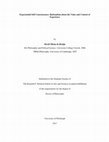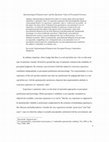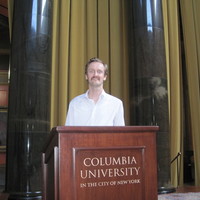Papers by David De Bruijn
Erkenntnis
Epistemological disjunctivists hold that perceiving subjects have “reflective access” to factive ... more Epistemological disjunctivists hold that perceiving subjects have “reflective access” to factive perceptual support for belief (Pritchard 2012, 2015). However, little has been done to elaborate the intended notion of reflection, or introspective awareness more generally. Moreover, critics have pointed out that the disjunctivist conception of “reflective access” can seem vulnerable to varieties of Williamson’s anti-luminosity argument (Haddock 2011). In this paper I defend disjunctivism from this charge, arguing that it holds the resources for a potent defense of the claim that knowledge of perceptual states is luminous. Indeed, I argue that appreciating the relation between disjunctivism and luminosity sheds critical light on how the disjunctivist conceives of perceptual support for belief.

The Southern Journal of Philosophy, 2022
In recent work, Scott Soames (2012, 2013, 2014, 2015) and Peter Hanks (2011, 2013, 2015) have dev... more In recent work, Scott Soames (2012, 2013, 2014, 2015) and Peter Hanks (2011, 2013, 2015) have developed a theory of propositions on which these are constituted by complexes of intellectual acts. In this paper, I adapt this type of theory to provide an account of perceptual content. After introducing terminology in section (1), in section (2) I detail the approach proffered by Soames and Hanks, focusing on Hanks’ version. In section (3) I introduce a problem that these theories face, namely how to account for the unity among the relevant intellectual acts. Section (4) provides an answer to this problem of unity, while section (5) explicates the relation to Soames and Hanks. In section (6) I extend the model to a theory of the unity of experiential consciousness.
Finally, in section (7) I apply the preceding considerations to debates about the nature of perceptual representation. The upshot will be that experiential unity is not simply a phenomenal feature of consciousness, but central to an account of the role perceptual representation plays in perceptual cognition.

Southern Journal of Philosophy
have developed a theory of propositions on which these are constituted by complexes of intellectu... more have developed a theory of propositions on which these are constituted by complexes of intellectual acts. In this article, I adapt this type of theory to provide an account of perceptual content. After introducing terminology in section 1, I detail the approach proffered by Soames and Hanks in section 2, focusing on Hanks's version. In section 3, I introduce a problem that these theories face, namely, how to account for the unity among the relevant intellectual acts. Section 4 provides an answer to this problem of unity, while section 5 explicates the relation to Soames and Hanks. In section 6, I extend the model to a theory of the unity of experiential consciousness. Finally, in section 7, I apply the preceding considerations to debates about the nature of perceptual representation. The upshot will be that experiential unity is not simply a phenomenal feature of consciousness, but central to an account of the role perceptual representation plays in perceptual cognition.
International Journal for the Study of Skepticism
Negative disjunctivists like Mike Martin and Bill Fish understand hallucinations in purely episte... more Negative disjunctivists like Mike Martin and Bill Fish understand hallucinations in purely epistemic terms, and do not attribute phenomenal character to these visual misfires. However, the approaches by Martin and Fish are importantly different, and there has been little systematic work on how negative disjunctivism is motivated. In this paper, I argue for a version of negative disjunctivism that centers on the idea that perception involves the exercise of a fallible self-conscious capacity. I claim that this at once explains hallucinations in purely negative terms that are close to Martin’s approach, while at the same time providing negative disjunctivism with an explanatory basis that Fish attempts to provide and Martin’s view lacks.

Episteme, 2020
Epistemological disjunctivists make two strong claims about perceptual experience's epistemic val... more Epistemological disjunctivists make two strong claims about perceptual experience's epistemic value: (1) experience guarantees the knowledgeable character of perceptual beliefs; (2) experience's epistemic value is “reflectively accessible”. In this paper I develop a form of disjunctivism grounded in a presentational view of experience, on which the epistemic benefits of experience consist in the way perception presents the subject with aspects of her environment. I show that presentational disjunctivism has both dialectical and philosophically fundamental advantages over more traditional expositions. Dialectically, presentational disjunctivism resolves a puzzle disjunctivists face in their posture vis-à-vis skeptical scenarios. More systematically, presentational disjunctivism provides an especially compelling view of disjunctivism as an internalist view of perceptual consciousness by explaining the way perceptual presence manifests the subject's rationality in a distinc...
Analytic Philosophy, 2018
Analytic Philosophy, 2018

Analytic Philosophy, 2022
According to epistemological disjunctivism (ED), ordinary perceptual experience ensures an opport... more According to epistemological disjunctivism (ED), ordinary perceptual experience ensures an opportunity for perceptual knowledge. In recent years, two distinct models of this idea have been developed. For Duncan Pritchard (2012, 2015), perception provides distinctly powerful reasons for belief. By contrast, Clayton Littlejohn (2016, 2017, 2018) and Alan Millar (2010, 2011) argue for a version of ED in terms of a "knowledge first" program, on which perception directly provides knowledge, without relying on antecedent reasons or justification. Specifically, both Littlejohn and Millar argue that "reasons first" ED faces a problematic regress. In this paper I defend "reasons first" ED by arguing that experience provides a type of reason that escapes the regress. I also argue that reasons are a fundamental aspect of ED, especially in its anti-skeptical stance.

In having a visual experience, we can come to know facts of at least two kinds: facts about our e... more In having a visual experience, we can come to know facts of at least two kinds: facts about our environment (“there is a red cup before me”), and facts about ourselves (“I am having an experience as of a red cup”). How do these types of knowledge—perceptual knowledge and perceptual self-knowledge—relate? For a certain type of rationalist a visual experience is identical with a form of self-awareness of the relevant visual experience. For you to be aware of having an experience E is nothing over and above you having E. Specifically, the rationalist holds that this fact is grounded in the way a capacity for thought expresses itself in experience as what I call experiential self-consciousness. I argue that this form of rationalism provides a novel way of approaching critical debates about visual experience, including the structure of perceptual representation and the grounds for perceptual knowledge. In experience things can self-consciously look to the subject to be specifically think...

Epistemological disjunctivists make two strong claims about perceptual experience's epistemic val... more Epistemological disjunctivists make two strong claims about perceptual experience's epistemic value: (1) experience guarantees the knowledgeable character of perceptual beliefs; (2) experience's epistemic value is "reflectively accessible". In this paper I develop a form of disjunctivism grounded in a presentational view of experience, on which the epistemic benefits of experience consist in the way perception presents the subject with aspects of her environment. I show that presentational disjunctivism has both dialectical and philosophically fundamental advantages over more traditional expositions. Dialectically, presentational disjunctivism resolves a puzzle disjunctivists face in their posture vis-à-vis skeptical scenarios. More systematically, presentational disjunctivism provides an especially compelling view of disjunctivism as an internalist view of perceptual consciousness by explaining the way perceptual presence manifests the subject's rationality in a distinct way.
A common argument for perceptual representational content starts from how in experience things lo... more A common argument for perceptual representational content starts from how in experience things look ("perceptual looks"). However, recently anti-representationalists have challenged the idea that perceptual looks can be associated with representation (Breckenridge 2007; Travis 2004, 2013). In this paper I defend the representationalist from these arguments. As I describe, the debate about perceptual looks turns on an issue of self-knowledge: the way the character of experience is subjectively available. On this issue, I argue for a view of experiential self-knowledge that supports the association between perceptual looks and representational content.
According to epistemological disjunctivism (ED), ordinary perceptual experience ensures an opport... more According to epistemological disjunctivism (ED), ordinary perceptual experience ensures an opportunity for perceptual knowledge. In recent years, two distinct models of this idea have been developed. For Duncan Pritchard (2012, 2015), perception provides distinctly powerful reasons for belief. By contrast, Clayton Littlejohn (2016, 2017, 2018) and Alan Millar (2010, 2011) argue for a version of ED in terms of a "knowledge first" program, on which perception directly provides knowledge, without relying on antecedent reasons or justification. Specifically, both Littlejohn and Millar argue that "reasons first" ED faces a problematic regress. In this paper I defend "reasons first" ED by arguing that experience provides a type of reason that escapes the regress. I also argue that reasons are a fundamental aspect of ED, especially in its anti-skeptical stance.
Frequently, the Paralogisms section of the Critique is read as rejecting a substantial conception... more Frequently, the Paralogisms section of the Critique is read as rejecting a substantial conception of the self. More specifically, Kant is taken to reject what he describes as the "Achilles" of rational psychology: an argument from the unity of the self to its substantiality. I challenge these two claims. On my understanding, Kant rejects merely a specific version of the Achilles found in rationalists like Wolff and Baumgarten. Understood correctly, Kant endorses a substantial view of the "I".











Uploads
Papers by David De Bruijn
Finally, in section (7) I apply the preceding considerations to debates about the nature of perceptual representation. The upshot will be that experiential unity is not simply a phenomenal feature of consciousness, but central to an account of the role perceptual representation plays in perceptual cognition.
Finally, in section (7) I apply the preceding considerations to debates about the nature of perceptual representation. The upshot will be that experiential unity is not simply a phenomenal feature of consciousness, but central to an account of the role perceptual representation plays in perceptual cognition.